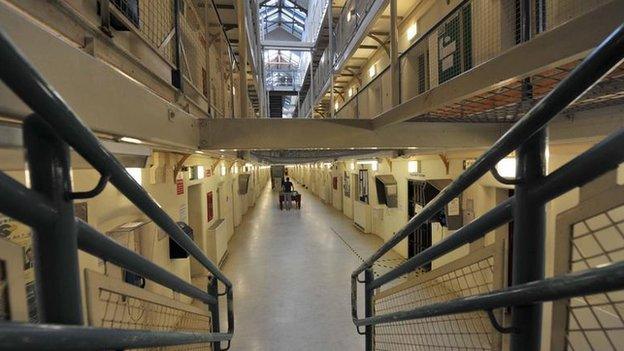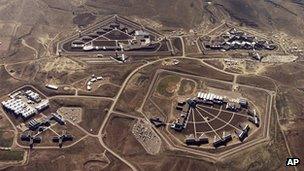The challenges of a 'super prison'
- Published

The proposed super prison will be around 25% bigger than the existing largest facility in England and Wales
The Ministry of Justice plans to close seven old jails in England and Wales, and is considering building a giant "super prison" capable of housing more than 2,000 inmates.
A number of mini prisons known as "house blocks" will also be built at existing jails.
Justice Secretary Chris Grayling says the move will make the prison system more cost-effective. So what would a super prison be like, and what challenges would it pose?
It is not known how long the government's "feasibility study" into a super prison might last, but Britain's biggest super jail could be built in the north-west of England, north Wales, or London.
The giant jail would outflank the country's largest jail, Oakwood, in Wolverhampton, by a quarter.
A super prison would be "cheaper and better," but there are "risks about having a big institution that then becomes difficult to control," explains former Conservative prisons and probations minister, Crispin Blunt.
"What is very important in a big prison is, not only the role of the prison governor and the leadership given there, but also the secondary and third tier level leadership.
"Big prisons give you the opportunity to have prisoners on wings who are on similar states of their sentences, receiving the right kind of rehabilitation, training, addiction courses and programmes."
'Giant warehouses'
The concept of super prisons is nothing new. A £2.9bn proposal for three 2,500-capacity "Titan" jails was considered and then scrapped by Labour in 2009.
Andrew Coyle, University of Essex emeritus professor of prison studies and a former governor of Brixton Prison, has "a real feeling of déjà vu" about the latest plan.
He points out that while in opposition, Conservative minister Dominic Grieve criticised Labour's prison proposals as akin to building "giant warehouses".
"We have clear evidence from the chief inspector of prisons and others that the ideal size for a well operating prison is about 500 - to go beyond that and you do begin to warehouse," Prof Coyle warns.
He says the move to giant prisons could "make the situation much worse" for prisoners already spending "too much time in their cells".
The possible locations of a super prison and the relocation of prisoners away from their communities is also a concern.
Mr Coyle says: "There are not 2,000 people in prison in north Wales. And if it is to be built in London, then the cost of both providing the land and building on it is going to be astronomical.
"That's what the previous government found when it carried out its feasibility study."
Director of Make Justice Work, Roma Hooper, adds: "These huge prisons will inevitably suck in offenders from a much wider geographical area, so you end up fragmenting the relationships they have with their families.
"And I cannot emphasise enough the importance of keeping prisoners in touch with their families. It's a major part of the rehabilitation process."
"It's hard to rehabilitate people in prisons. The real gains are to be made if you can keep an offender in his or her community, and let them give back without taking them too far away."
"I think a super prison would be be very depersonalised. And you've heard about it being a university of crime - it's not a healthy environment."
'Absolutely opposed'
The Prison Officers Association has also questioned the practicalities of managing such an institution.
"It's such a massive change from normal prison culture in this country. We don't think it would be very stable," says Mark Freeman, deputy general secretary of the Prison Officers Association.

The UK is not likely to go down the route of having US-style supermax prisons
Paddy Scriven, general secretary of the Prison Governors Association says that while being "absolutely opposed" to the concept of super prisons, there are possibly ways to improve on them.
A group of prisons "working as a cluster" with one kitchen and interchangeable staff could save money.
But the impact of such giant jails on the local community could be huge, she adds. "Say you need about 3,000 staff for a super prison. Where do they come from, does it plough jobs into the community or does it become an almost single employer?
"And then there's transport for all the staff and visitors travelling and moving there. It soon dictates the local economy.
"Giant prisons are much more difficult to manage and the risks are very high. Riots are mercifully rare, but they can escalate very quickly. Having one big prison raises that risk.
She insists the UK is not likely to go down the route of the American super-max prison system. "Their guards are armed, there is little rehabilitation and prisons are exceptionally violent. That system is not being imported," she says.
"If the government does intend to look at very, very large prisons, they need to go for a very long consultation process with prison professionals."
- Published10 January 2013
- Published10 January 2013
- Published10 January 2013
- Published9 January 2013
- Published24 May 2012
- Published9 January 2013
- Published9 January 2013
- Published3 January 2012